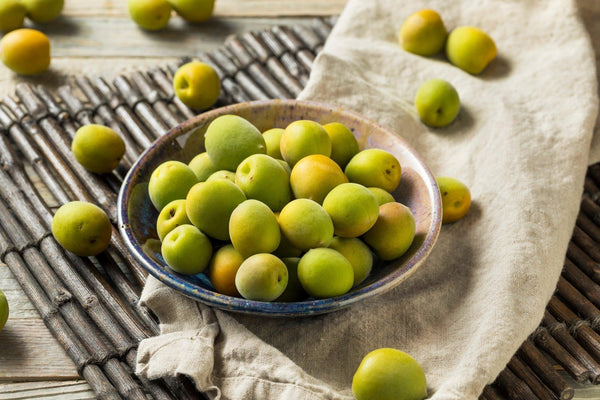
Jump to:
In Japan, the start of spring is traditionally associated with ume (plum blossom). This is because plum blossoms are one of the earliest flowers to bloom in the spring and is often recognized as a symbol of new beginnings and hope for a better future. The association between ume and the start of spring in Japan has been around for centuries and continues to be celebrated today.
You can find ume blossoms blooming around Japan from February to the end of March and although similar in appearance to cherry blossoms, there are some subtle differences to tell them apart. Plum blossom petals have round tips, unlike cherry blossoms which are more oval in shape, and they also grow directly on the branch, unlike sakura which grows on stems. Plum blossoms also come in a variety of colors, including red, which you don’t see with cherry blossoms.
Ume is embedded deeply within Japanese culture, from the blossoming trees across Japan to use in food and drunk. In this article, we’ll examine some of the most popular ume products and uses you’ll find in Japan.
History Of Ume In Japan

This small, tart fruit has been a part of Japanese culture for centuries and is an important element in many traditional ceremonies, recipes, and folk remedies. From its ancient origins to modern uses, the history of Japanese ume is one worth exploring.
Ume is believed to have been imported to Japan from China sometime around 700AD, where it was used as a medicine called ubai. During Japan’s Muromachi Period, it was widely used by samurai soldiers to flavor rice and vegetables and to give them an energy boost. Later during Japan’s Edo Period, umeboshi (pickled plums) became a popular food among Japanese people and continued to grow in popularity, earning its place as a staple item within Japanese cuisine.
Health Benefits Of Ume
Ume is known to have a variety of health benefits, from helping to reduce inflammation and improve digestion to boosting immunity and aiding in weight loss. Ume contains essential vitamins and minerals that work together to provide a powerful nutritional boost that can help keep your body healthy and functioning at its best.
Ume has been found to be high in antioxidants which are effective in reducing and stabilizing free radicals - unstable atoms that can damage cells, causing illness and aging. Ume also has a high number of polyphenols which benefit bone health and increase the production of collagen. Research has found that ume may also help to stabilize your blood sugar levels, block the growth of cancer cells, and protect the liver.
What Does Ume Taste Like?

The ume fruit has a tart, fruity flavor, and an aroma similar to apricots. Because of their high astringency, they are not consumed raw and need to be fermented or pickled before consumption to avoid stomachaches.
When eating umeboshi for the first time, the pickled version of ume plums, you’re likely to have a strong reaction to the dramatic flavor this fruit provides. Salty, tangy, and extremely sour, they are definitely an acquired taste that can take some getting used to for beginners!
Types Of Ume - Nanko-Ume

Nanko ume is considered to be one of the highest-quality types of ume fruit. It is typically larger than other kinds of ume and can be up to 5 centimeters in diameter compared to the average size of 2-3 centimeters. It has a thin skin and soft flesh and is harvested mainly in Wakayama Prefecture which produces around 60% of ume. Once Nanko-ume have been harvested during the plum season, they are turned into a variety of delicious products including umeshu, ume jelly, ume juice, and of course, umeboshi!
Most Popular Uses For Ume
Ume is mainly used in a variety of edible dishes and drinks in Japan. Here are some of the most consumed ume products:
Umeboshi

Typically eaten during the wintertime, umeboshi is pickled ume and is said to be an immunity booster and a popular hangover cure! The sour and salty flavor is often used to balance other flavors in traditional dishes, as well as being eaten on its own. Umeboshi can be eaten in a variety of ways, from adding it to salads, onigiri, or rice dishes to simply eating it on its own as a snack.
The pickling process involves salt-drying and then adding vinegar for preservation for at least three months. The salt slows the aging process and naturally preserves the fruit, while the vinegar balances the sour flavor of umeboshi. During the fermentation process, red shiso leaves are also added to give the umeboshi their pink color. You can read more about umeboshi in this article.
Umeshu

Umeshu is a traditional and popular Japanese alcoholic beverage made from ume fruit. It has a sweet and sour taste, with an alcohol content ranging from 10-20%. This liquor is often enjoyed on its own straight up, over ice, or with hot water, and can also be used as an ingredient in cocktails or other drinks.
Umeshu is made by stewing plums in sugar and a type of alcohol called shochu, and then it is aged for up to a year before it’s ready for consumption. It’s really easy to make at home and doesn’t require any special equipment or licenses in Japan, so many people make it at home, or restaurants make their own umeshu to serve to customers.
You can also try making umeshu cocktails, there are some pretty good recipes to be found online like these ones from Japanese ume manufacturer, Nakata Foods!
Ume As An Ingredient

In addition to umeboshi and umeshu, ume is a popular ingredient used to flavor other types of edible products. For example, ume jam and ume cordial have both become increasingly popular in recent years, and you can also find confectionary in Japan with an ume flavor – like ume candies and even ume Kit Kats!
5 Ume Themed Products To Try At Home!
Ready to dive in and experience the unique taste of ume for yourself? Check out these five ume-themed products from the Japanese Taste store:
Ume Jam
Tokiwa ume plum is a sweet and tangy jam made from plump, juicy nanko plums, delicately soaked in fragrant apple and pear vinegar, and sweetened with honey. This luxurious confiture is perfect for spreading on toast, mixing into yogurt, or enjoying as part of a breakfast treat.
Its rich, fruity flavor comes with the added touch of vinegar, giving it a unique twist. Ideal for those who enjoy a bit of sweetness with a refreshing zing.

[callout-1]
Umeboshi
Experience the best of Japan with umeboshi sourced from Yano Noen, a plum farm located in Oita Prefecture in Kyushu. These top-grade plums are pickled to perfection, providing an authentic Japanese taste in every bite. Enjoy a unique umami flavor and all the health benefits that come with it, all while being free from additives or preservatives. This specialty product is seasoned only with salt, shiso, and plum vinegar so you can be assured of its high quality.

[callout-2]
Ume Incense Sticks
These premium Japanese incense sticks from renowned incense producer Baikundo have a refreshing ume fragrance to capture the essence of Japanese springtime in your home. These sticks are less smoky than regular incense and have a burn time of around 25 minutes – the perfect duration for a meditation session or quick yoga workout!

[callout-3]
Ume Plum Vinegar
Give yourself a unique and flavorful culinary experience with Yano Noen's Ume Plum Vinegar. This ume vinegar is made with high-quality Japanese ume fruit, traditional sea salt, and red shiso for an unforgettable combination of sour and salty umami taste. Brighten up your dishes with its beautiful wine-red color, or use it as a pickling base for vegetables, salad dressing, or even a sauce for fish and meat dishes.

[callout-4]
Nobel Otoko Ume Japanese Plum Sour Soft Candy
Prepare for a mouth-puckering experience with ume sour candy! A unique combination of sweet and sour, this tangy treat packs a punch like no other. With its tough texture, the umeboshi powder coating slowly melts away to reveal an unexpectedly sweet taste. Whether you're a fan of umeboshi or just like sour candy, you'll love this flagship product from manufacturer Nobel. Our customers also highly rate this candy calling it awesome and addictive!

[callout-5]
Koikeya Stick Suppamucho Ume Plum Potato Stick Chips
Spice up your snack selection with Koikeya's Stick Suppamucho Ume Potato Chips! These unique ume-flavored potato stick chips have a delectable combination of salty, sour, and slightly sweet flavors and make for a tasty snack on the go thanks to their compact packaging.

[callout-6]
Interested in learning more about Japanese fruit? Check out this article!


0 comments